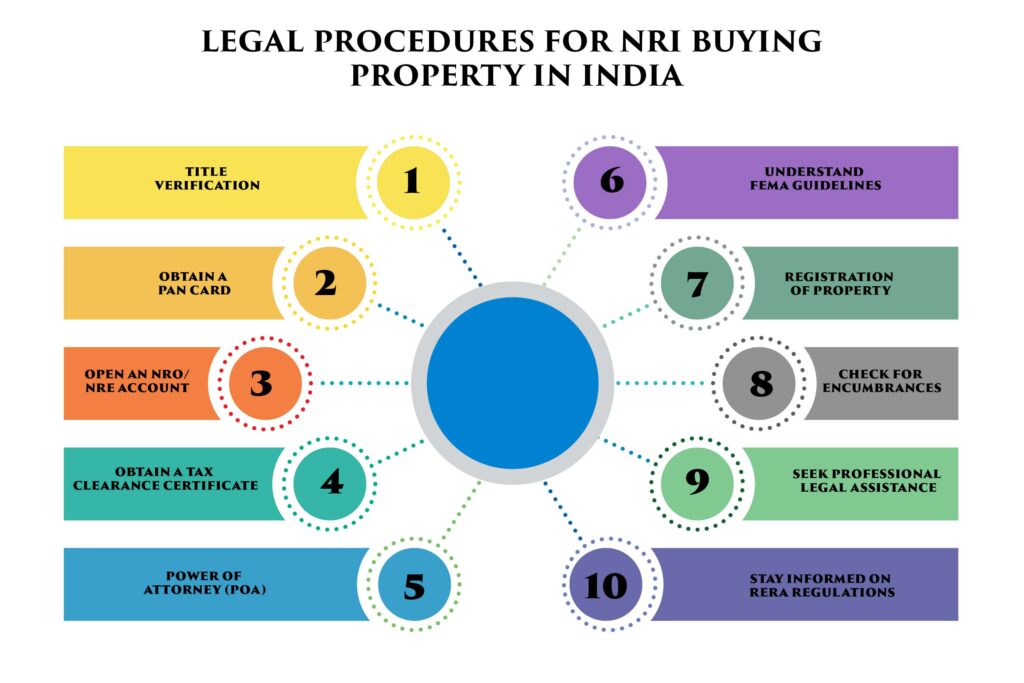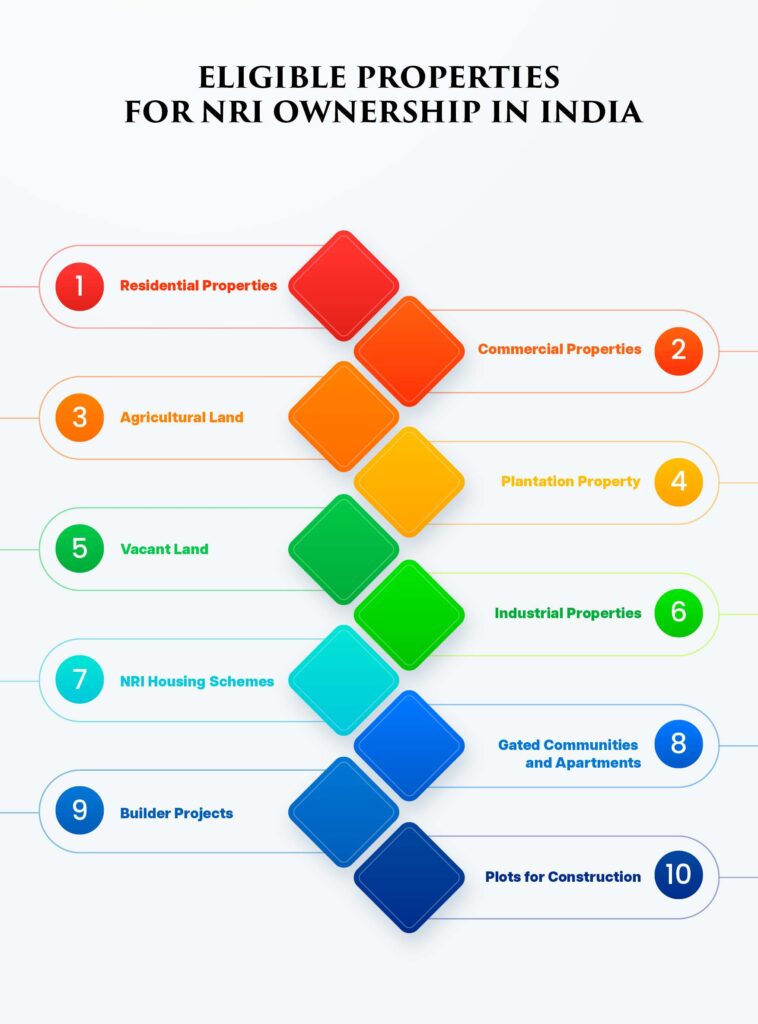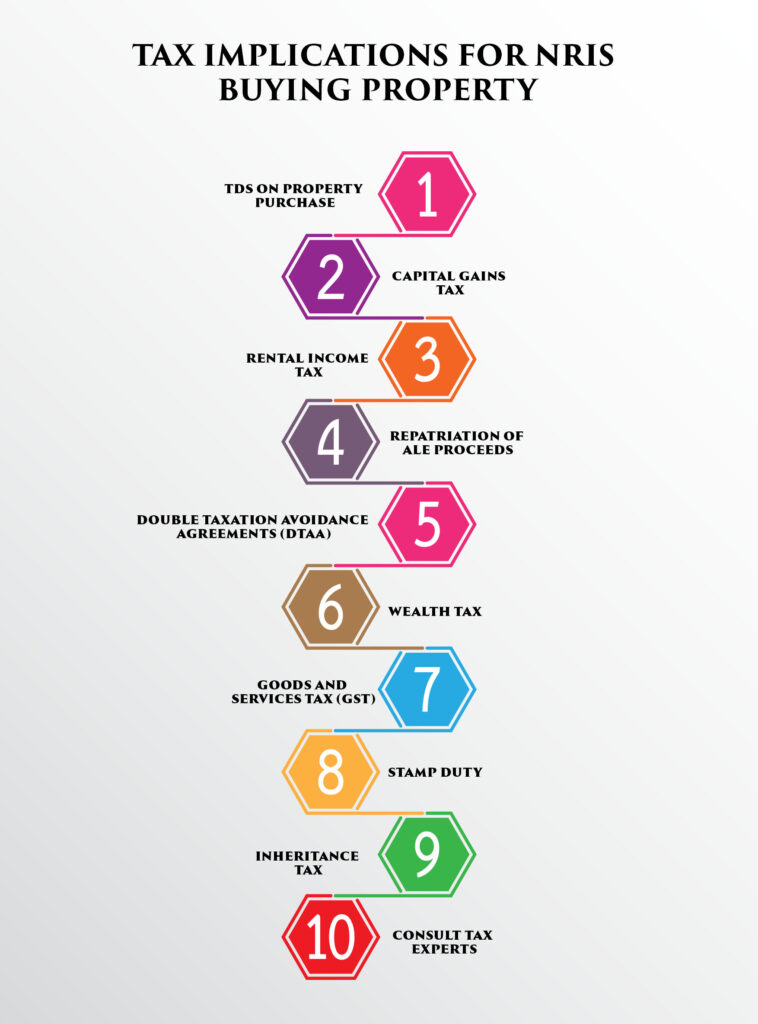
NRI Buying Property in India 2024 – 6 Things You Need to Know
Nri Buying Property in India 2024 - 6 Things You Need to Know
In the dynamic landscape of real estate, Non-Resident Indians (NRIs) are increasingly drawn towards property investments in India. As we navigate the nuances of 2024, here are six crucial aspects every NRI needs to know when contemplating real estate ventures in the country.
What Is the Legal Procedures for Nri Buying Property in India?

The legal procedures governing NRI buying property in India demand meticulous attention. From understanding the Foreign Exchange Management Act (FEMA) to adhering to property ownership regulations, navigating the legal landscape is a prerequisite for a seamless transaction. The following are the NRI home buying process:
Title Verification:
Conduct a comprehensive title search to ensure the property has a clear and unencumbered ownership history.
Obtain a PAN Card:
Acquire a PAN card, a mandatory document for NRIs investing in Indian property.
Open an NRO/NRE Account:
Set up a Non-Resident Ordinary (NRO) or Non-Resident External (NRE) account in an Indian bank for financial transactions.
Obtain a Tax Clearance Certificate:
Secure a Tax Clearance Certificate from the Income Tax Department to comply with tax regulations.
Power of Attorney (POA):
If physically absent, appoint a trusted representative through a Power of Attorney for property transactions.
Understand FEMA Guidelines:
Adhere to the guidelines outlined in the Foreign Exchange Management Act (FEMA) to facilitate smooth fund transfers.
Registration of Property:
Ensure the property is duly registered at the local registrar’s office to validate the legal transfer of ownership.
Check for Encumbrances:
Verify the property for any existing legal liabilities or encumbrances that may affect ownership.
Seek Professional Legal Assistance:
Engage the services of a qualified real estate lawyer to navigate the Legal aspects of NRI property purchase transactions.
Stay Informed on RERA Regulations:
Familiarize yourself with the NRI real estate regulations and Development) Act (RERA) for added consumer protection.
Which Types of Properties Are Eligible for Nri Ownership in India?

Buying real estate in India 2024 has Certain property types that hold eligibility for NRI ownership. knowing the options available aligns with informed decision-making NRI buying property in India.
Residential Properties:
Residential property for NRIs, NRIs can own houses, apartments, and condominiums for personal use or as an investment.
Commercial Properties:
Non-Resident Indians have the eligibility to invest in commercial spaces like offices, retail areas, and warehouses.
Agricultural Land:
Subject to specific guidelines and restrictions, NRIs are allowed to acquire agricultural land in certain states.
Plantation Property:
NRIs can own plantation properties typically used for agricultural activities, adhering to relevant regulations.
Vacant Land:
Investment in vacant land for future development or long-term strategies is an option available to NRIs.
Industrial Properties:
NRIs have the opportunity to invest in real estate properties, including manufacturing units and factories.
NRI Housing Schemes:
Some states offer exclusive housing schemes catering to the specific real estate needs of NRIs.
Gated Communities and Apartments:
NRIs can explore secure and convenient Property options for NRIs in 2024 like gated communities and apartments.
Builder Projects:
Investing in ongoing or upcoming builder projects is a viable avenue for NRI ownership.
Plots for Construction:
NRIs can purchase plots with the intent of constructing their homes in the future
How Can NRI's Secure Affordable Home Loans for Property Investment in 2024?
Securing affordable home loans is pivotal for NRIs venturing into property investment. Guidelines for NRI property buyers involve delving into the intricacies of loan applications, interest rates, and eligibility criteria for a financially sound investment.
Research Financial Institutions:
Conduct thorough research on banks and financial institutions offering home loans to NRIs, considering interest rates and terms.
Check Eligibility Criteria:
Understand the eligibility criteria for NRI home loans, including income requirements, employment stability, and credit history.
Explore Loan Types:
Explore different types of home loans available to NRIs, such as fixed-rate, floating-rate, or a combination of both.
Consider Loan Amount and Tenure:
Determine the loan amount needed and the preferred tenure, keeping in mind affordability and long-term financial goals.
Factor in Interest Rates:
Analyze the interest rates offered by various lenders, considering fixed and floating rates, and choose the most favorable option.
Evaluate Processing Fees:
Be aware of processing fees associated with NRI home loans and choose a lender with reasonable and transparent fee structures.
Understand Prepayment and Foreclosure Terms:
Clarify prepayment and foreclosure terms to assess flexibility and potential charges associated with early repayment.
Check for Special NRI Schemes:
Explore if financial institutions offer special schemes or benefits tailored for NRIs, such as discounted interest rates or customized loan features.
Seek Professional Financial Advice:
Consult with financial advisors or experts specializing in NRI investments to gain insights into the most suitable loan options.
Stay Updated on Regulatory Changes:
Keep up to date on any regulatory changes impacting NRI home loans to make informed decisions.
If you are curious about learning more about Real Estate, please take a moment to read this blog. – ‘’Which are the best residential projects in Chennai?’’
Are You an NRI Buying Property in India - Tax Implications That You Should Consider

Are You an NRI Buying Property in India? Vijay Shanthi Builders Is There for Your Assistance
Tax implications for NRIs buying property play a crucial role. From understanding the legal requirements for NRI buying property in India to comprehending the tax implications, being well-versed in these Property purchase guidelines for NRIs aspects ensures a financially sound investment.
TDS on Property Purchase:
Be aware of the Tax Deducted at Source (TDS) on property transactions and ensure compliance with the prevailing rates and regulations.
Capital Gains Tax:
Understand the implications of capital gains tax when selling a property, considering the holding period and generated gains.
Rental Income Tax:
Account for taxes on rental income, acknowledging the applicable rates and provisions for deductions.
Repatriation of Sale Proceeds:
Be mindful of guidelines and restrictions on repatriating sale proceeds abroad after selling the property.
Double Taxation Avoidance Agreements (DTAA):
Familiarize yourself with the DTAA between India and your residing country to avoid the risk of double taxation.
Wealth Tax:
Consider potential wealth tax implications, especially for high-value properties owned in India.
Goods and Services Tax (GST):
Factor in GST for under-construction properties, understanding the applicable rates and its impact on financial planning.
Stamp Duty:
Pay attention to stamp duty rates, as they vary across states, impacting the overall cost of property transactions.
Inheritance Tax:
Stay informed about any potential changes in inheritance tax legislation, even though India currently does not have this tax.
Consult Tax Experts:
Seek advice from tax experts or professionals specializing in NRI taxation for personalized guidance and accurate interpretation of tax laws.
How Can NRI's Effectively Manage and Maintain Their Properties From Abroad?
Investing in Indian real estate from Abroad, The geographical distance between NRI buying property in India and their Indian property market for non-residents necessitates effective management and maintenance strategies. Implementing robust systems for property upkeep, tenant management, and addressing legal requirements remotely ensures a seamless experience.
Appoint a Local Representative:
Designate a trustworthy local representative or property manager to oversee day-to-day operations and address concerns promptly.
Leverage Technology:
Embrace property management platforms and technology solutions to remotely monitor security, utilities, and maintenance.
Establish Regular Communication:
Maintain open communication channels with neighbors, tenants, and local authorities to stay informed about property conditions and developments.
Engage Reliable Service Providers:
Collaborate with reliable service providers for routine maintenance, cleaning, and repairs to ensure the property remains in optimal condition.
Implement Preventive Maintenance:
Schedule regular inspections and preventive maintenance to identify and address potential issues before they escalate.
Set Up Automated Payments:
Facilitate seamless payment processes by setting up automated transactions for property-related expenses and bills.
Plan for Emergency Situations:
Develop a comprehensive plan for emergencies, including contacts for local maintenance services and authorities.
Maintain Updated Documentation:
Keep all property-related documentation updated, including leases, agreements, and insurance policies, ensuring legal compliance.
Utilize Local Real Estate Services:
Engage local real estate services for property management, especially if specialized knowledge or immediate physical presence is required.
Stay Informed About Local Regulations:
Regularly update yourself on local regulations and property laws to navigate any changes that may impact property management.
How Does NRI Residency Status Impact Property Ownership and Taxes in India?
NRI buying property in India has significantly influenced property ownership and taxation in India. As per Indian law, an NRI can own both residential and commercial properties in the country without any restrictions. However, the tax implications and regulations differ based on the property’s usage.
Property Ownership:
NRIs can freely own immovable property in india, including land, residential houses, commercial real estate, and agricultural land (subject to certain conditions).
There are no limitations on the number of properties an NRI can own in India.
Tax Implications:
Taxation varies based on the property’s usage – whether it is rented out, self-occupied, or left vacant.
For rental income: NRIs need to pay income tax on the rental income earned from properties in India. The rate is typically 30%, and TDS (Tax Deducted at Source) applies.
Capital Gains Tax: NRIs are liable to pay capital gains tax on the profit earned from the sale of property in India. Long-term capital gains are taxed at 20% with indexation benefits, and short-term gains are taxed at applicable income tax rates.
Repatriation: NRIs can repatriate the sale proceeds (after fulfilling certain conditions) from the sale of property in India, within the limits set by the Reserve Bank of India (RBI).
Residential Status for Taxation:
The tax implications for an NRI buying property in India depend on their residential status. NRIs are taxed in India based on their source of income and residential status (whether resident or non-resident).
An individual’s residential status is determined by the number of days they stay in India during a financial year.
Key Considerations:
Compliance with regulations: NRIs must adhere to Indian laws, including obtaining necessary permissions, adhering to FEMA guidelines, and filing taxes correctly.
Seeking professional advice: Due to the complexities involved, NRIs are often advised to consult tax experts or legal professionals specializing in NRI taxation and property laws in India.
Are You an NRI Buying Property in India? Vijay Shanthi Builders Is There for Your Assistance
Are you an NRI planning to invest in property in India? Look no further! Vijay Shanthi Builders stands ready to assist you every step of the way. Whether you are searching for a residential or commercial property, our dedicated services cater to your needs at Vijay Shanthi Builders Discover Exquisite Apartments in Manapakkam! Looking for apartments for sale in Manapakkam? Explore our range of premium 2 BHK apartments in Manapakkam, offering luxurious amenities and a serene living experience. Trust Vijay Shanthi Builders for your property needs in India as an NRI!
FAQs:
What Documents Are Required for an Nri to Purchase Property in India?
Yes, NRIs need specific documents like passport, PAN card, OCI/PIO card, and proof of address for property acquisition in India.
Do NRI's Have to Pay TDS on Property Purchases in India?
Yes, NRIs are subject to Tax Deducted at Source (TDS) on property purchases in India, usually at the rate of 20.8%.
Do NRI's Need an Aadhar Card to Purchase Property in India?
Aadhar card isn’t mandatory for NRI’s to buy a property in India. Other valid documents like a passport and PAN card suffice.
Can NRI's Send Money to Parents in India for Property Purchase?
Yes, NRI’s can send funds to their parents in India for property investment, but certain regulations and limits apply.
Can an NRI Buy Property in India Without Physical Presence?
Yes, NRIs can purchase property in India without physical presence by executing a Power of Attorney (POA) to an authorized representative
In conclusion, the year 2024 presents a plethora of opportunities for NRI buying property in India. By delving into the nuances of legal procedures, property eligibility, home loans, tax implications, and effective property management, NRIs can navigate the real estate landscape with confidence.
Chandan Jain
I'm Chandan Jain, Managing Director of Vijay Shanthi Builders. My journey into the realm of construction and urban development began with a profound passion for excellence and innovation. Join me as we explore the dynamic world of real estate, discovering top properties, understanding market trends, and making informed decisions together.
Related Posts
How to Improve Your Credit Score Before Applying for a Home Loan?
How to Improve Your Credit Score Before Applying for a Home Loan? Are you looking
5+ Tips to Manage Home Loan Emis During a Financial Crisis
5+ Tips to Manage Home Loan EMIs During a Financial Crisis Handling home loan EMIs
7 Do’s and Don’ts of Vastu in Buying a Flat – Home Buyer Should Follow
7 Do’s and Don’ts of Vastu in Buying a Flat - Home Buyer Should



